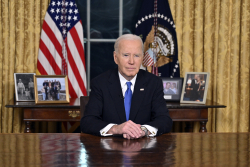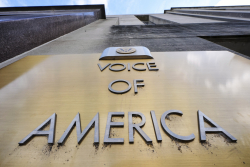Energy dominance without energy diplomacy is a road to nowhere that imperils both the security of the United States and American business interests.
President Trump has rightly focused attention on a critical issue in bolstering America’s national security and economic future: the essential role of energy and critical minerals, The State Department’s decision to eliminate the United States’ global diplomatic leadership in those areas, however, cedes that ground to America’s rivals.
Energy and critical minerals are quintessential strategic commodities. Most other countries do not play by the same rules as the United States. There are obvious cases of this, such as Russia weaponizing its gas and uranium supplies or China working to corner resource reserves and critical infrastructure across continents. More broadly, outside of the United States, energy and minerals markets are highly regulated and state-dominated. They are prone to manipulation, corruption, and the imposition of barriers that block access by the United States.
The Bureau of Energy and Natural Resources (ENR) at the State Department was created in 2011 for two reasons. First, there is the fact that energy and critical resources pervade multiple national security risks, from political and economic coercion to funding terrorism. Second, traditional diplomacy, lacking both market expertise and strategic focus, was not up to the task. As the late Senator Lugar (R-IN) argued ahead of the ENR’s creation, energy and critical minerals are existential issues for friends and foes alike and thus need to be on the agenda of our most senior diplomats.
The State Department’s Bureau of Energy and Natural Resources’ Triumphs
The creation of the ENR Bureau realigned existing resources and reflected rare bipartisan support for a new approach to diplomacy that works closely with industry to unleash the power of the U.S. economy. ENR works by speaking abroad with the authority that comes from having a Senate-confirmed envoy, and by using its own lean staffing to leverage resources across the government. Energy diplomacy, through ENR, helped Europe achieve freedom from Russia’s gas monopoly. Energy diplomacy created linkages between Israel, Jordan, and Egypt to help moderate tensions. Energy diplomacy built coalitions that allowed for the imposition of punishing oil sanctions. Energy diplomacy creates conditions for U.S. investment in African minerals. Energy diplomacy fights for the protection of U.S. foreign investment overseas and fair treatment of our exports.
Perhaps the most vivid success has been the United States’ own use of LNG exports to protect the national economic security of our friends and allies in Europe and Asia. It would be naïve to believe that happened — and that trade will continue to grow — without the robust U.S. diplomacy led by the ENR.
It would be equally naïve to believe that reliable access to minerals critical for U.S. national security in Africa and Latin America will happen without concerted diplomatic efforts to both open markets and improve the rule of law to allow for private investment.
The Path Ahead for Energy Diplomacy
Over a decade after the ENR Bureau’s creation, the urgency of its mission has grown. Both the major foreign policy challenges on the administration’s agenda and the administration’s focus on securing American domestic industry require experienced energy diplomats. Today, China dominates sixty percent of the worldwide production of critical minerals and eighty-five percent of the world’s processing capacity, let alone its dominance of manufacturing batteries and solar energy components. Gas and oil remain essential tools of despotic regimes in Russia, Iran, and Venezuela. Natural resources are too often perverted or even leveraged to fund both conflict and corruption. Meanwhile, U.S. national imperatives to establish resilient supply chains, open markets to U.S. commodities and goods, and lead in advanced technologies, including AI, require more — not less — specialized diplomatic effort.
With so much at stake, there is no reason why the State Department should undermine President Trump’s energy dominance agenda and cede the field to our rivals for the sake of arbitrary headcount reductions. Energy dominance, which we generously define as assuring the protection of free markets, the ability of U.S. companies to access foreign investment overseas, collective energy security to repel the monopolization of resources by our adversaries, and achieving American superiority in all forms of energy — from oil and gas to critical minerals to clean energy technologies — requires energy diplomacy.
Eliminating the ENR Bureau is turning the clock back decades. It is unilateral disarmament in a critical theater that will hurt American business and security.
David L. Goldwyn served as special envoy for international energy affairs under President Obama and led the creation of the Energy and Natural Resources Bureau. Neil Brown served on the senior Republican staff of the Senate Foreign Relations Committee leading former Senator Richard Lugar’s (R-IN) initiative to establish the bureau. Goldwyn and Brown are nonresident senior fellows at the Atlantic Council’s Global Energy Center.
Image: Shutterstock/metamorworks

















